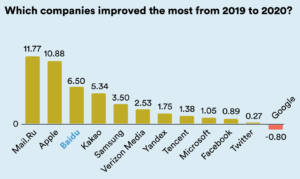This is the RADAR, Ranking Digital Rights’ newsletter. This special edition was sent on March 17, 2021. Subscribe here to get The RADAR by email.
In this final special edition of the RADAR, we’re highlighting RDR Founding Director Rebecca MacKinnon’s essay on three of China’s leading tech companies—Alibaba, Baidu, and Tencent.

The above graph compares the amount by which digital platforms improved between 2019 and 2020, on indicators that remained unchanged between the two index cycles. Learn more.
In 2020, Baidu, which operates China’s leading search engine, improved significantly on indicators that held steady between our 2019 and 2020 indexes, as seen above.
In a surprising move in late 2020, Baidu published a human rights policy. The policy is limited in scope (the company pledges to protect human rights “within the bounds of national law”), but this was still an unusual step for a Chinese tech company.
What caused Baidu to do this? More broadly, what are the forces that push Chinese companies to change?
Spotlight on China’s tech giants
In her essay for the 2020 RDR Index, Rebecca offers an expert analysis of the market and political forces driving decision-making at Alibaba, Baidu, and Tencent. In the introduction, she writes:
RDR media hits
MIT Technology Review: In a long read on how Facebook’s “relentless pursuit of growth” has increased polarization and the spread of misinformation, Karen Hao quoted RDR Editorial Director Ellery Biddle commenting on the company’s “Responsible AI” initiative:
“It seems like the ‘responsible AI’ framing is completely subjective to what a company decides it wants to care about. It’s like [saying], ‘We’ll make up the terms and then we’ll follow them.’ I don’t even understand what they mean when they talk about fairness. Do they think it’s fair to recommend that people join extremist groups, like the ones that stormed the Capitol? If everyone gets the recommendation, does that mean it was fair?” Read via Tech Review
Digital Privacy News: “Facebook is extremely opaque about how it develops and deploys algorithms,” RDR Research Director Amy Brouillette told Digital Privacy News, for a story on AI and privacy risks. “Facebook does not publicly commit to protect users’ expression and privacy rights as it trains and deploys algorithms…Nor does it conduct risk assessments about the impact of these systems on freedom of expression and privacy.” Read via Digital Privacy News
Protocol: Last week’s edition of the Protocol | China newsletter pointed to our research on the leading Chinese companies, noting that they published no information about how they handle government requests for user data. Read via Protocol
Bloomberg: A story on network shutdowns in Africa cited research by RDR Company Engagement Lead Jan Rydzak, which showed that curbing access to social media “tended to fuel rather than reduce violence.” The story continued: “internet shutdowns in Algeria and Sudan did nothing to quell protests—and may in fact have stoked outrage and accelerated their leaders’ downfalls.” Read via Bloomberg
Where to find us
CIPE Philippines | Putting Digital Rights on the Corporate Governance Agenda
March 23 at 9:00 PM EST | Register here
Rebecca will join the Center for International Private Enterprise, a core institute of the National Endowment for Democracy, to discuss technology’s role in democratic society in Southeast Asia.
The Policy Circle | Big Tech Tightrope: Balancing Free Speech, Privacy & Innovation
March 24 at 1:00 PM EST | Register here
Rebecca will join Steve DelBianco, president of NetChoice, and Jillian York, director of International Freedom of Expression at the Electronic Frontier Foundation to discuss the fundamentals of free speech on social media and public policy reforms for big tech companies.
Subscribe here to get The RADAR by email.




